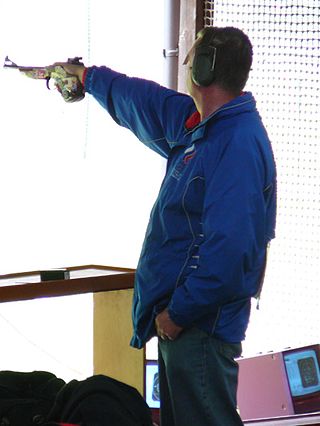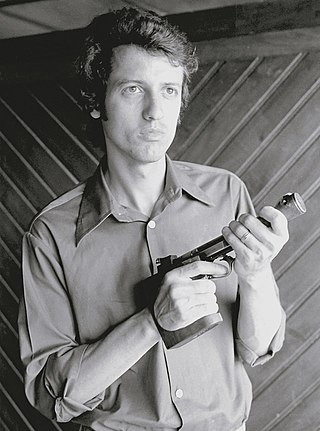
50 meter pistol, formerly and unofficially still often called Free Pistol, is one of the ISSF shooting events. It is one of the oldest shooting disciplines, dating back to the 19th century and only having seen marginal rule changes since 1936. It is considered to provide some of the purest precision shooting among the pistol events. The target of this event has not changed since 1900, and the 50m distance has remained the standard since 1912. The sport traced back to the beginning of indoor Flobert pistol parlour shooting in Europe during the 1870s.

The men's ISSF 25 meter rapid fire pistol competition at the 2004 Summer Olympics was held on 21 August at the Markopoulo Olympic Shooting Centre near Athens, Greece. This was the last Olympic competition before the major rule changes that took place on 1 January 2005, and which lowered the results of the event. There were 17 competitors from 14 nations.

The men's ISSF 50 meter pistol competition at the 2004 Summer Olympics was held on 17 August at the Markópoulo Olympic Shooting Centre near Athens, Greece. There were 42 competitors from 31 nations.

The men's ISSF 50 meter pistol event at the 2008 Olympic Games took place on August 12 at the Beijing Shooting Range Hall. There were 45 competitors from 32 nations. The event was won by Jin Jong-oh of South Korea, the first of his three consecutive victories in the free pistol. It was his second medal, after taking silver in 2004; he was the 10th man to win multiple medals in the event.

The men's ISSF 50 meter pistol competition at the 2000 Summer Olympics was held on 19 September. There were 36 competitors from 27 nations. Nations had been limited to two shooters each since the 1952 Games. Tanyu Kiryakov won, becoming the first shooter to win Olympic gold medals in both this event and 10 metre air pistol. 2.7 points behind, Igor Basinski won his fourth Olympic medal. Kiryakov's gold was Bulgaria's first free pistol victory, and the first medal of any color in the event for the nation since 1980. Martin Tenk's bronze was the Czech Republic's first medal in the event.

The men's ISSF 50 meter pistol was one of the fifteen shooting events at the 1996 Summer Olympics, held on 23 July at the Wolf Creek Shooting Complex in Atlanta. There were 45 competitors from 28 nations. It was the first time decimals were used in the 50 metre pistol finals. Boris Kokorev set a new Olympic record after scoring 570 points in the qualification round and 96.4 in the final, winning the gold medal, while places 2 through 5 were occupied by Belarusian and Italian shooters. Russia, Belarus, and Italy all received their first medal in the free pistol. Silver medalist Igor Basinski was the ninth man to win multiple medals in the event.

The men's ISSF 50 meter pistol was one of the thirteen shooting events at the 1992 Summer Olympics. There were 44 competitors from 29 nations. Nations had been limited to two shooters each since the 1952 Games. The competition was held on 26 July 1992 at the Mollet del Vallès shooting range.

The men's ISSF 50 meter pistol was one of the thirteen shooting events at the 1988 Summer Olympics. It was the second Olympic free pistol competition to feature final shooting, after an abortive attempt in 1960. There were 43 competitors from 31 nations. Nations had been limited to two shooters each since the 1952 Games. The event was won by Sorin Babii of Romania, the nation's first victory in the event and first medal in free pistol since 1972. Ragnar Skanåker of Sweden repeated as silver medalist, the second man to earn three medals in the free pistol; four years later, he would become the first to win four medals. Soviet Igor Basinski took bronze.

The mixed ISSF 50 meter pistol was a competition at the 1972 Summer Olympics. It was held on 27 August 1972 at Schießanlage in Munich. There were 59 competitors from 36 nations. Nations had been limited to two shooters each since the 1952 Games.

The men's ISSF 50 meter pistol event at the 2012 Olympic Games took place on 5 August 2012 at the Royal Artillery Barracks. There were 38 competitors from 27 nations. The event was won by Jin Jong-oh of South Korea, the second of his three consecutive victories in the free pistol. He was the first shooter to win two individual free pistol gold medals. It was his third medal in the event, making him the fourth man to earn three free pistol medals. His countryman Choi Young-rae took silver, the first time since 1976 that a nation had finished 1–2 in the event. Chinese shooter Wang Zhiwei received bronze.

The mixed ISSF 25 meter rapid fire pistol shooting competition at the 1980 Summer Olympics was held on 25 July at the Dynamo Shooting Range in Moscow, USSR. There were 40 competitors from 25 nations. Nations had been limited to two shooters each since the 1952 Games. The event was won by Corneliu Ion of Romania, the nation's first victory in the event since 1956 and second overall. East German Jürgen Wiefel repeated as silver medalist, becoming the sixth man to win multiple medals in the event. Austria earned its first rapid fire pistol medal with Gerhard Petritsch's bronze.

The men's ISSF 50 meter pistol event at the 2016 Olympic Games took place on 10 August 2016 at the National Shooting Center. There were 41 competitors from 29 nations. The event was won by Jin Jong-oh of South Korea, his third consecutive victory in the free pistol. He was the only man to win two gold medals in the event, much less three. Jin was also the second man to win four medals of any color in the event, after Ragnar Skanåker of Sweden from 1972 to 1992. Hoàng Xuân Vinh took silver, the first medal for Vietnam in the event. Kim Song-guk's bronze was North Korea's first medal in the free pistol since 2004.

The men's ISSF 50 meter pistol was a shooting sports event held as part of the Shooting at the 1948 Summer Olympics programme. It was the seventh appearance of the event. The competition was held on 2 August 1948 at the shooting ranges at London. 50 shooters from 22 nations competed. Nations had been limited to three shooters each since the 1932 Games. The event was won by Edwin Vásquez of Peru in the nation's debut in the free pistol. Vásquez is still the only Peruvian athlete to win a gold medal at an Olympic Games. Rudolf Schnyder of Switzerland took silver. Defending champion Torsten Ullman of Sweden earned bronze, the second man to win multiple medals in the event.

The men's ISSF 50 meter pistol was a shooting sports event held as part of the Shooting at the 1952 Summer Olympics programme. It was the eighth appearance of the event. The competition was held on 25 July 1952 at the shooting ranges in Helsinki. 48 shooters from 28 nations competed. The maximum number of shooters per nation was reduced to 2, from 3 in previous Games. The event was won by Huelet Benner of the United States, the nation's first victory in the event since 1920. Silver went to Ángel León Gozalo of Spain and bronze to Ambrus Balogh of Hungary; they were the first medals in the free pistol for both nations.

The men's ISSF 50 meter pistol was a shooting sports event held as part of the Shooting at the 1956 Summer Olympics programme. It was the ninth appearance of the event. The competition was held on 30 November 1956 at the shooting ranges in Melbourne. 33 shooters from 22 nations competed. Nations had been limited to two shooters each since the 1952 Games. The winner was Pentti Linnosvuo of Finland, the nation's first medal in the free pistol. The Soviet Union also won its first medal in the event, with Makhmud Umarov's silver. American Offutt Pinion took bronze.

The men's ISSF 50 meter pistol was a shooting sports event held as part of the Shooting at the 1960 Summer Olympics programme. It was the tenth appearance of the event. The competition was held on 5 and 6 September 1960 at the Umberto I Shooting Range in Rome. 67 shooters from 40 nations competed. Nations had been limited to two shooters each since the 1952 Games. The event was won by Aleksey Gushchin of the Soviet Union, as the Soviet team finished 1–2 with Makhmud Umarov repeating as silver medalist. Yoshihisa Yoshikawa of Japan took bronze.

The men's ISSF 25 meter rapid fire pistol was a shooting sports event held as part of the Shooting at the 1964 Summer Olympics programme. It was the 12th appearance of the event. The competition was held on 19 October 1964 at the Camp Asaka shooting ranges in Tokyo. 53 shooters from 34 nations competed. Nations had been limited to two shooters each since the 1952 Games. The event was won by Pentti Linnosvuo of Finland, the nation's first victory in the event. Linnosvuo was the fourth man to win multiple medals in the event, adding to his 1960 silver; it was his fourth straight Games finishing in the top 5 of the event. Ion Tripșa of Romania took silver, putting that nation back on the podium after a one-Games absence. Czechoslovakia's first rapid fire pistol medal came in the form of Lubomír Nácovský's bronze.

The mixed ISSF 50 meter pistol was a shooting sports event held as part of the Shooting at the 1968 Summer Olympics programme. It was the twelfth appearance of the event, and the first where the competition was open to women. The competition was held on 18 October 1968 at the shooting ranges in Mexico City. 69 shooters from 42 nations competed. Nations had been limited to two shooters each since the 1952 Games. The event was won by Grigory Kosykh of the Soviet Union in a shoot-off, the nation's second victory in the event. Heinz Mertel of West Germany took silver while Harald Vollmar of East Germany took bronze, with each nation earning a medal in their first competition separate from each other; they were the first medals for any German shooter in the free pistol since 1936.

The mixed ISSF 50 meter pistol was a shooting sports event held as part of the Shooting at the 1976 Summer Olympics programme. It was the fourteenth appearance of the event. The competition was held on 18 July 1976 at the shooting ranges in Montreal. 47 shooters from 31 nations competed. Nations had been limited to two shooters each since the 1952 Games. The event was won by Uwe Potteck, with East Germany finishing 1–2 as Harald Vollmar took silver. It was East Germany's first victory in the event. Rudolf Dollinger of Austria repeated as bronze medalist. Vollmar and Dollinger were the fifth and sixth men to win multiple medals in the free pistol. Potteck had only begun the sport 23 months prior to his victory and his previous personal best in domestic competitions was a 568. In addition, his practice scores leading up to the games averaged around 563 to 565.

The men's ISSF 50 meter pistol was a shooting sports event held as part of the Shooting at the 1984 Summer Olympics programme. The competition was held on July 29, 1984, at the shooting ranges in Los Angeles. 56 shooters from 38 nations competed. Nations had been limited to two shooters each since the 1952 Games. The event was won by Xu Haifeng of China, with his countryman Wang Yifu taking bronze. As the free pistol was the first medal event in 1984 and the People's Republic of China fully competed for the first time in 1984, these were the first Olympic medals won by competitors from that nation. Ragnar Skanåker of Sweden took silver, 12 years after winning his first medal ; he was the seventh man to win multiple medals in the event and third to win medals 12 years apart.













